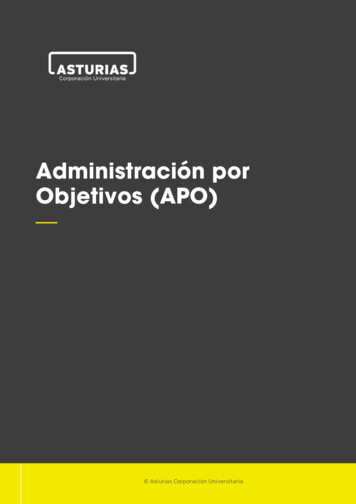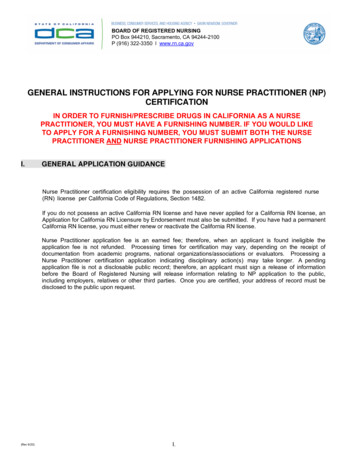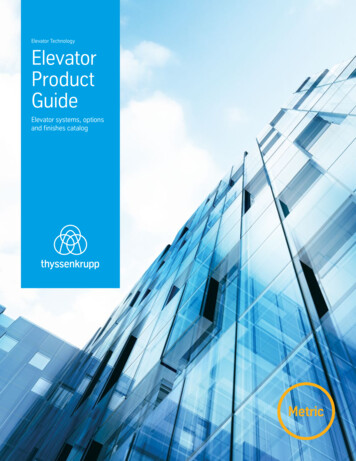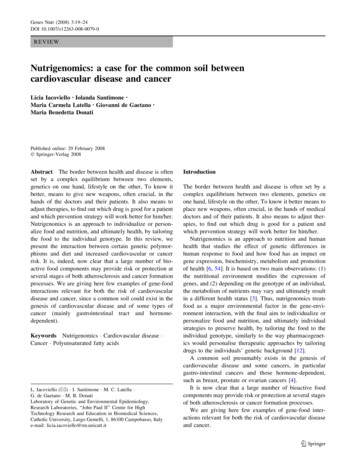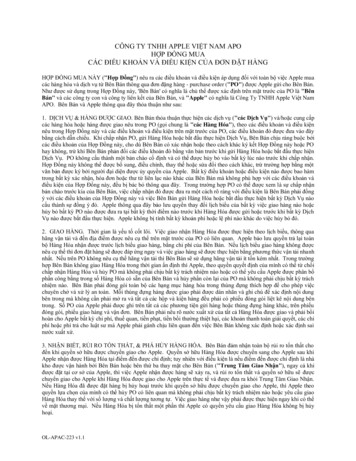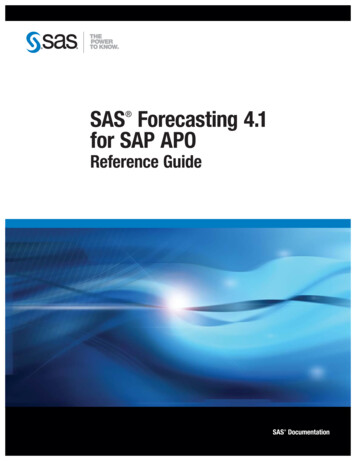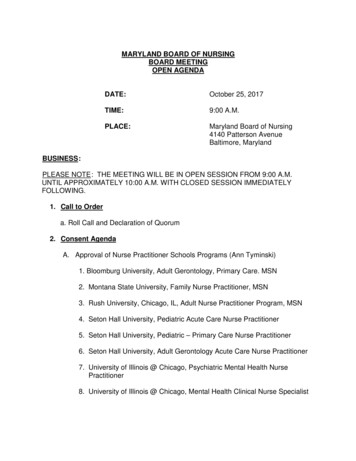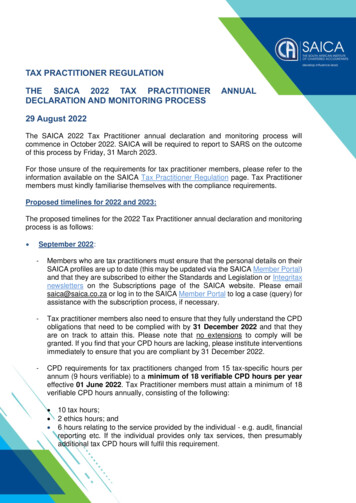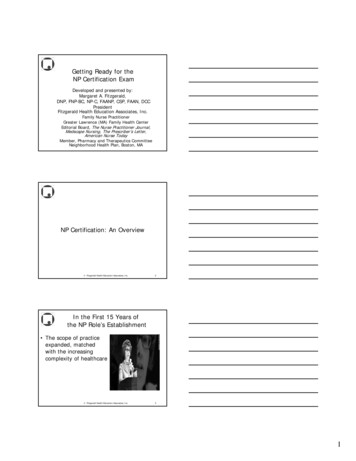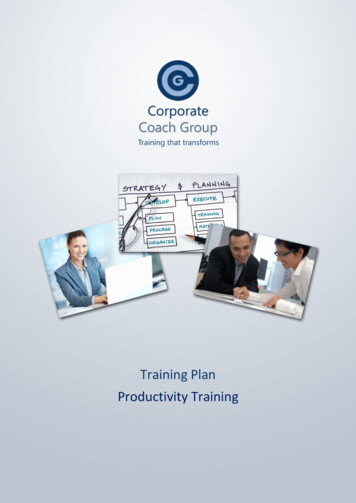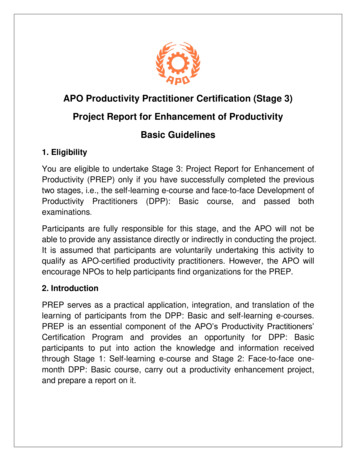
Transcription
APO Productivity Practitioner Certification (Stage 3)Project Report for Enhancement of ProductivityBasic Guidelines1. EligibilityYou are eligible to undertake Stage 3: Project Report for Enhancement ofProductivity (PREP) only if you have successfully completed the previoustwo stages, i.e., the self-learning e-course and face-to-face Development ofProductivity Practitioners (DPP): Basic course, and passed bothexaminations.Participants are fully responsible for this stage, and the APO will not beable to provide any assistance directly or indirectly in conducting the project.It is assumed that participants are voluntarily undertaking this activity toqualify as APO-certified productivity practitioners. However, the APO willencourage NPOs to help participants find organizations for the PREP.2. IntroductionPREP serves as a practical application, integration, and translation of thelearning of participants from the DPP: Basic and self-learning e-courses.PREP is an essential component of the APO’s Productivity Practitioners’Certification Program and provides an opportunity for DPP: Basicparticipants to put into action the knowledge and information receivedthrough Stage 1: Self-learning e-course and Stage 2: Face-to-face onemonth DPP: Basic course, carry out a productivity enhancement project,and prepare a report on it.
Participants who completed the self-learning e-course and DPP: Basic canregister and apply for certification as a productivity practitioner through thepreparation of a PREP.3. ObjectivesThe PREP aims to enable participants to: Demonstrate skills either as a productivity trainer, productivityconsultant, or productivity promoter; Prepare and develop a project on productivity and qualityimprovement; Practice project management, team, training, and time management;and Showcase individual hands-on applications of learning through aproductivity enhancement project.4. Timeline for Submission of the PREPWithin 3 to 6 months of completion of the DPP: Basic course dependingupon the type and number of projects.5. Time RequirementParticipants are expected to spend 200 hours in total in all three stages ofthe PREP as explained below. Participants can conduct one large projector three small projects totaling 200 hours.While submitting the report, the participants must indicate the number ofhours spent on each stage of the project(s).6. Approach and MethodologyThe PREP should focus on tangible, effective utilization of knowledge andlearning from Stage 1 and Stage 2 after completion of DPP: Basic.The PREP covers three types of projects: type 1, productivity promotion;type 2, productivity training; and/or type 3, productivity consultancy/
implementation. You can undertake one or more types as long as thenumber of hours spent totals 200 (minimum 1 and maximum 3 projects).Type 1: Productivity promotion basically includes but is not limited to thedevelopment of a productivity agenda for an organization; preparation of acomprehensive productivity promotion plan with goals, objectives, roles andresponsibilities, timeline, and resources required at organizational level;and preparation of innovative dissemination materials based on productivitythemes.Type 2: Productivity training includes carrying out need assessment,preparing actions plan for training, preparing training material, andconducting training for at least 30 to 40 people covering at least twoproductivity tools/techniques in which you are confident.Type 3: Productivity consultancy/implementation includes carrying outa productivity improvement project in an organization utilizing at least oneproductivity tool/technique that you have mastered.PREP has three stages: 1) initial preparation/diagnosis; 2) projectimplementation; and 3) report preparation. It can be carried out in your ownorganization, another organization, or the NPO in your country.The preparation stage refers to the conceptualization, deciding the scopeof the project, and preparing an action plan for execution of the project.This stage also includes identification of issues and problems andjustification for the project. Participants must inform their NPOs and ownorganizations of the project in writing.The implementation stage refers to the period of project implementation,monitoring, and evaluation of project milestones and results. It is theresponsibility of participants to document the highlights and milestones ofproject implementation based on the project action plan. During theimplementation period, it is important for participants to coordinate andcommunicate with the institutional partner(s) and the project team forupdates and on any concerns.
Report preparation includes compilation and documentation of the entireproject including photos of the preparation and implementation stages andresults of the project. Depending upon the quality and contents of the report,the APO may utilize it as a case study in its workshops, programs, and/orpublications.Note: It is understood that not all participants may have the necessaryaccess to carry out the implementation stage of type 3 projects. In thatcase, partial implementation could be considered. Participants must reportany constraints and limitations to explain why full implementation was notfeasible. Type 1 projects do not necessarily include the implementationstage. However, any efforts made to do so will be considered in the overallPREP ionFigure 1. The PREP process follows this model.Chart 1. Three stages of PREP.
Stage 1: Preparation Preparation for theproject Identification ofissues/problems Objective of the project Scope and timeline Approach andmethodology Identification ofinstitutional partners Overall project plan Written notification toyour APO Liaison Officerand supervisor/head oforganizationStage 2: Implementation Implementation ofproject Implementation plan Identification ofconstraints inimplementation, if any Partial or fullimplementaion Documentation andrecordkeeping Monitoring andevaluation of projectmilestonesStage 3: ReportPreparation Collation and compilationproject activities, data,and results Compilation of photos,worksheets, and relatetdstatistics Compilation anddocumentation ofpartial/full results andoutcome or expectedresults/outcome Submission of 3 hardcopies and one soft copyto the APO7. Outputs/Submission Required Application to become an APO-Certified Productivity Practitioner(attached format) A summary of productivity projects (part 5 of the above application) A project report(s) in three hard copies (print-outs) and one soft copy(CD/DVD) to be sent to:K.D. BhardwajSenior Program OfficerAsian Productivity Organization1-24-1 HongoBunkyo-ku, Tokyo 113-0033JapanThe report should include all data, work sheets, photos, and othernecessary documents utilized during the project. Letter of endorsement from the NPO and your organization8. Sample Report Format
Participants must submit reports in the following format:Font and point size: Arial, 12 pointSpacing: double spacedMargins: All 2.54 cmPagination: Number every page and ensure that numbers are consistentwith the table of contentsPaper size: A4The report must include but not be limited to the following. Project TitleAcknowledgmentsTable of ContentsOrganizational ProfileProductivity and Quality Improvement Situation (description of theproblem identified by participant)ObjectivesProject Outputs/DeliverablesProject Action PlanProject MilestonesProject Implementation ResultsLessons Learned from Project ImplementationPhoto Documentation of the ProjectSustainability PlanConclusionAnnexes/Reference DocumentsThe Annexes/Reference Documents should contain the following: Endorsement letter/form from the NPO and your organization Any other data/photos/worksheets/statistics/dissemination material,etc.
9.PREP Evaluation ProcessThe project report will be comprehensively evaluated by a three-memberpanel of experts consisting of the DAP (NPO Head), a third party (externalexpert), and the APO (Director-Industry Department). The evaluationcriteria will primarily include showing a clear understanding of productivitytools/techniques; overall understanding of the participant; analysis of issues,approaches, and methodology; detailed process; and presentation of facts,figures, and overall results or intended results/outcome.Participants will be informed of the evaluation results within 30 days ofPREP submission.Depending upon the quality of the project report and decision of the panelof experts, some participants may be given extra time to improve, revise,and resubmit the report.10. Overall ResultsBased on the performance of participants in the self-learning e-course,face-to-face DPP: Basic, and PREP, the APO will decide whether to issuecertification and report the decisions to participants individually.
SAMPLE FORMSFinal report endorsement form (NPO)To: The APOFrom: NPOContent:This is to endorse the PREP prepared and submitted by Mr./Ms (name,nesignation, organization, country) . The report may be considered by theAPO for evaluation as part of the process for becoming an APO-Certified ProductivityPractitioner.Thank you.Signed:APO Liaison OfficerDate:The final report endorsement form (Organization)To: The APOFrom: Participant’s Organization or organization in which the project wasconductedContent:This is to endorse the PREP prepared and submitted by Mr./Ms (name,designation, organization, country ) . The report may be considered by theAPO for evaluation as part of the process for becoming an APO-Certified ProductivityPractitioner.Thank you.Signed:Supervisor of participant and/or head of the organization where the project wasconducted.Date:
PREP is an essential component of the APO's Productivity Practitioners' Certification Program and provides an opportunity for DPP: Basic participants to put into action the knowledge and information received through Stage 1: Self-learning e-course and Stage 2: Face-to-face one- month DPP: Basic course, carry out a productivity enhancement .
